
- Subject:
- Biology
- Material Type:
- Unit of Study
- Provider:
- Rice University
- Provider Set:
- OpenStax College







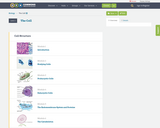
Biology, The Cell is an unit of study no. 3 of the Biology full course. It is grounded on studying cells, including cell structure, structure and function of plasma membranes, metabolism, cellular respiration, photosynthesis, cell communication, and cell reproduction.
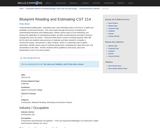
Understanding building plans, estimating costs, and scheduling orders is the key to a viable and profitable construction business. This course goes through the process of reading and understanding blueprints and building plans, defines various types of cost estimating, and teaches the application of scheduling principles, all while incorporating the principle of process management and cost control. Advanced skills will be covered, including Quantity Take-Offs (QTO) which are detailed measurements of materials and labor needed to complete a construction project, and practice in Value Analysis, which is a systematic plan to gather information, identify various ways of meeting requirements, evaluating the value and costs, and presentation to the client. Overall, students will be qualified to read prints, plans and specifications, and in turn price projects
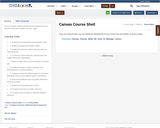
This is a Canvas course shell that can be imported into your Canvas course and modified to fit your needs.
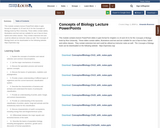
This module contains lecture PowerPoint slides in pptx format for chapters 11-15 and 19-21 for the Concepts of Biology book by Rice University. These slides contain tables, illustrations and text and are suitable for use in face-to-face, hybrid and online classes. They contain extensive text and could be utilized as instructor notes as well. The Concepts of Biology book can be downloaded on the following website: https://openstax.org/.
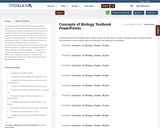
The biology material in these PowerPoint presentations comes from an OER (Open Education Resource) textbook. The textbook is Concepts of Biology, by Rice University. The textbook can be found on the following website under the subject of science: https://openstax.org/
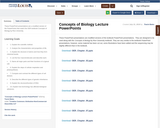
These PowerPoint presentations are a modified version of the PowerPoints that match the OER textbook Concepts of Biology by Rice University.
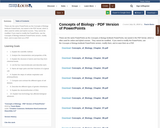
These are the same PowerPoints as the Concepts of Biology textbook PowerPoints, but saved in the PDF format, which is often used for online and hybrid courses. They cannot be modified. If you need to modify the PowerPoints, use the Concepts of Biology textbook PowerPoints version, modify them, and re-save them as a PDF.
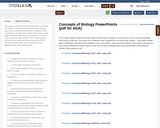
This module contains lecture PowerPoint slides in pdf format for chapters 11-15 and 19-21 for the Concepts of Biology book by Rice University. They have been modified for ADA compliance for use with screen readers. These slides contain tables, illustrations and text and are suitable for use in face-to-face, hybrid and online classes. They contain extensive text and could be utilized as instructor notes as well. The Concepts of Biology book can be downloaded on the following website: https://openstax.org/.
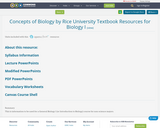
This is information to be used for a General Biology I (or Introduction to Biology) course for non-science majors.
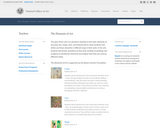
The goal of this unit is to introduce students to the basic elements of art (color, line, shape, form, and texture) and to show students how artists use these elements in different ways in their work. In the unit, students will answer questions as they look carefully at paintings and sculpture to identify the elements and analyze how they are used by different artists.
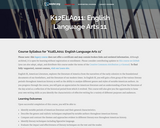
English III, American Literature, explores the literature of America from the narratives of the early colonists to the foundational documents of our forefathers, and the literature of our modern times. In English III, you will gain a firm grasp of the various literary periods throughout American history as well as the ability to analyze different genres and styles of notable American authors. As you progress through the course, you will gain an appreciation for American literature and an understanding of how the literature of the day acted as a reflection of the historical period from which it evolved. This course will also give you the opportunity to hone your own writing skills as you identify the characteristics of effective writing for a variety of different purposes and audiences.

Explore how your own mind works, and discover how the limitations of the human brain can lead to major miscarriages of justice.
Despite advances in forensic science, eyewitness testimony remains a critical component of criminal investigations. Psychological research has revealed the dangers of relying on evidence gained from an eyewitness and also how careful the police need to be when questioning witnesses (Source: OpenLearn, The Open University's website).

This free course, Forensic science and fingerprints, covers how science can make fingerprints easier to study, how they are used in court and some of the questions about the extent to which fingerprint identification is sound and scientific. Students will learn the principles used in classifying and matching fingerprints (often called marks). (Source: OpenLearn, the Open University website).